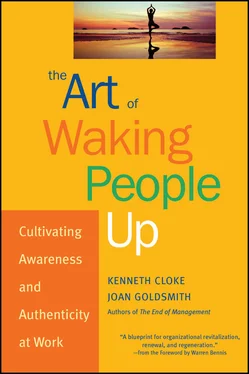In receiving critical feedback, for example, we often confuse the finger pointing at us with the person pointing it, and as a result, minimize, justify, or deny the behavior they are trying to call to our attention. We dismiss them by castigating their methods or intentions. We resist their efforts to communicate, and become unable to observe ourselves, evaluate the information they offer, or improve our skills. Human beings are not the only animals that give each other feedback, but we may be the only ones who judge, devalue, insult, berate, humiliate, self-aggrandize, and lie to each other about who we are. We defend ourselves to such an extent that we fail to recognize our true selves. At the same time, our success and survival sensitively depend on our ability to be aware and authentic, to discover what is taking place around and inside us, and to learn from the feedback we receive from others.
Ultimately, waking up means self-examination—not as narcissism, but as though it were feedback from an outside observer. It means looking at what keeps us from looking, listening to the reasons we are unable to listen, and becoming aware of the distortions we create in our own awareness. As we become more awake, we are able to spend more time in the present, reduce our preoccupation with the past and the future, and magnify our ability to recognize, accept, and learn from our mistakes.
Often, when we perform some routine task such as driving on a freeway or engaging in repetitive labor at work, we slip into a reverie and cease being aware of what we are doing. We operate on autopilot. Suddenly, a car swerves in front of us, or a machine breaks down, or the unexpected occurs. Immediately, we wake up, become aware of what we are doing, and tune in to our environment. Yet even then, many of us prefer to remain half-asleep or search for scapegoats, excuses, or places to hide. With awareness, we become better able to face breakdowns, take responsibility for them when they occur, fix them quickly, and avoid long-term damage. Sleepwalking not only dims our ability to foresee and fix breakdowns, it leaves us more vulnerable to harm and less able to recover afterward.
When we protect ourselves from information that could fundamentally alter our ideas about ourselves and the world around us, we defend a fragile status quo and in the process become weaker and more vulnerable. We become unable to move beyond the polished images we hope others have of us—or, strangely, even the tarnished ones we have of ourselves, including the one that we are unworthy or unlovable. We tell stories about who we are and what we could be, do, or have if it were not for other people’s perfidy or for conditions over which we have no control.
In the end, waking up is simply awareness. Awareness is openness to feedback, and feedback is information we can interpret in an infinite variety of ways. We have a choice. We can resist, deny, or defend ourselves against this information, or we can decide to learn from it, adapt, and evolve. We can use it to feel sorry for ourselves, or to castigate others, or to wake up and become stronger. It is up to us to attribute meaning, draw conclusions, and act on the information we receive.
Awareness is available to each of us at every moment. It exists only in the present. It is an intrinsic quality of mind that can move from place to place and increase or decrease in scope and intensity of concentration. It can take the form of a spotlight that identifies shifts in the foreground or a floodlight that emphasizes congruity in the background. Over time, it can be cultivated, exercised, and enhanced, just as it can be neglected, abandoned, and allowed to atrophy.
The first goal of waking up is simply to increase our awareness by maximizing our ability to use internal and external feedback, which consists of information we can use to improve our skills and performance. The second, deeper and more profound goal of waking up is to become more authentic, centered, skillful, and content with who we are as human beings. As Buddhist nun Pema Chodrun writes:
Life’s work is to wake up, to let the things that enter into the circle wake you up rather than put you to sleep. The only way to do this is to open, be curious, and develop some sense of sympathy for everything that comes along, to get to know its nature and let it teach you what it will. It’s going to stick around until you learn your lesson, at any rate. You can leave your marriage, you can quit your job, you can only go where people are going to praise you, you can manipulate your world until you’re blue in the face to try to make it always smooth, but the same old demons will always come up until finally you have learned your lesson, the lesson they came to teach you. Then those same demons will appear as friendly, warmhearted companions on the path.
By being awake and aware in this way, we are able to discover the vibrancy and beauty that is naturally present in our day-to-day lives, and become clearer, more authentic human beings.
Whenever we do something that lacks integrity or consciously harms another person, we become counterfeit and unbalanced. Whenever we collapse our identity into a role, or allow our self-worth to be crushed by someone else’s negative opinion of who we are, or pretend to be someone we aren’t, we become divided and less congruent. Whenever we reduce our awareness, operate on autopilot, or anesthetize ourselves against “the slings and arrows of outrageous fortune,” we diminish our capacity to be authentic.
The joyful authenticity of children never fails to capture our attention or warm our hearts. Yet we rarely give ourselves the same opportunity to be joyful, impetuous, genuine, and playful at work. Instead, we retreat behind self-aggrandizing egos, dreary hierarchical responsibilities, scripted bureaucratic roles, and closely guarded communications. We will ourselves to ignore or suppress the parts of ourselves that are trying to be free. Unfortunately, the self that learns to survive in these conditions is a colorless being. We are like crabs who carry the shells we grow at work during the rest of our lives. How sad it is to realize how much of ourselves we set aside at work and how little we make available to others, or even to ourselves.
The difficulty is that, in the short term, living authentically requires greater energy and courage than retreating into dullness and insensitivity, particularly in organizations that place a premium on superficiality, posturing, and blind acquiescence. In rigidly hierarchical organizations, those who behave authentically risk being marginalized or losing their jobs. Inauthenticity is encouraged by the use of bureaucratic, superficial, tedious, worse-than-useless feedback systems that stimulate defensiveness and pretense, and are widely perceived as isolating, undermining, and threatening to self-confidence. Sadly, these workplaces are dangerous for those who want to learn from their mistakes. They actively reduce responsibility and discourage leadership. Yet it is clear from research and elementary logic that authenticity contributes directly to increased motivation, organizational capacity, and economic success.
We first become inauthentic by uncritically accepting other people’s judgments about who we are. We are reduced in families and schools to a series of labels. We are “unpopular,” “bad at math,” “unable to carry a tune,” “unable to handle stress,” or “poor at follow through.” These early examples of hierarchically imposed feedback reveal how easy it is to capitulate to someone else’s image of who we are out of self-protection, laziness, or lack of self-confidence. Yet the power of these judgments is not that we are told we are incapable of something, but that we believed it and stopped trying because we did not think we could succeed.
Читать дальше











